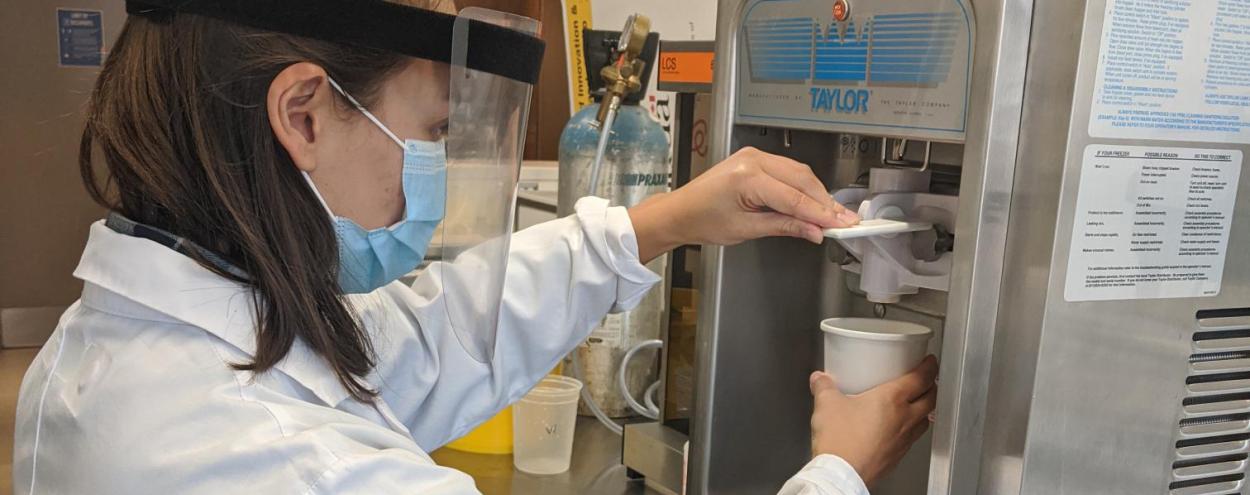
Companies have always needed to evolve quickly to stay relevant in an ever-changing market, but just how hard that can be has been magnified by the COVID-19 pandemic. Relieving this pain point is exactly what Research & Innovation at George Brown College aims to do, running an average 100 projects a year that help industry innovate with minimal risk and dependable access to college resources and expertise.
“Industry access to innovation is absolutely crucial for economic recovery,” says Dr. Krista Holmes, Director of Research & Innovation. “Demand didn’t slow when the COVID-19 pandemic started, it intensified. Most companies don’t have access to in-house research facilities and expertise, so they come to us.”
The majority of applied research activities at the college have been able to continue remotely, save for a handful of on-site, lab-based projects. In early July, select Research & Innovation facilities reopened under strict guidelines, the first being the Fashion Exchange (FX), who began to produce masks and hospital gowns by special order.
Other researchers now on-site are getting used to the new normal.
Hands-on help from a distance
The Food Innovation & Research Studio (FIRSt) is a facility run by a team of food scientists, chefs, and operational staff helping with product concept, market research services, and product scale up for food and beverage clients.
One of FIRSt’s key services is a two-hour interactive work session: clients use the FIRSt kitchens to make their product while food scientists observe the production process and work backwards to troubleshoot challenges. During the early stages of lockdown, the team made the process virtual, setting up video chats between kitchens. “We couldn’t fix the products with our own hands,” says Dan Reilly, Senior Manager at FIRSt, “but we could help guide them to a solution.”
The physical lab reopened in early July with three food scientists on site, operating with dedicated work stations, frequent sanitizing and staggered work hours.
“We’ve been getting used to the new lab dynamic,” says Emily Lim, a Food Science Technologist. Client visits need “a little more foresight,” she says, with taste tests now taking place behind Plexiglass and remote team members joining virtually to offer feedback.
The work hasn’t slowed down. Lim is currently perfecting the dough for a fresh take on steam buns, for a client who wants to tap into their customers’ desire to recreate their favourite meals safely at home.
With more people cooking at home, there are new opportunities for FIRSt’s clients to develop new products more in line with how consumers are now shopping. Post-COVID, they’ve been seeing an uptick in shelf stable products, food products designed for convenience and non-alcoholic beverages.
Overall, the team has taken all the challenges in stride. “We’re still able to actively collaborate,” Lim says. “It just looks a little different.”
Meet the makers
Located on the Casa Loma Campus, the Product Development Exchange (PDx) helps companies develop and manufacture physical goods quickly, with less risk, more guidance and a faster path to market. The lab is equipped to do rapid prototyping, which is when ideas and concepts are developed, tested and redeveloped within a short span of time. In a nutshell: they make things.
The lab is run by James McIntyre, and staffed by technicians Ryan Billinger and John Allan Ellingson, all also professors in the Mechanical Engineering department. Since its inception in 2014, PDx has worked with 36 partners on 47 projects, producing 152 prototypes, including a device that recycles rainwater, a stair-climbing robot, and a system to encourage hand-washing for infection control.
Early on during the pandemic, the lab fielded dozens of requests to collaborate on PPE and other COVID-focused projects. The team was very eager to get back in the lab.
“Our partners didn’t close,” McIntyre says simply. “We work with a lot of small to medium sized companies, and a lot of them are going through hardship. Our job is to help them get through that.”
The lab officially reopened in mid-July, reducing the lab’s footprint and developing strict protocols. The team were recently part of a successful Mitacs grant to work on ROSA, a service robot developed by Quantum Robotic Systems, a product with the potential to help elderly and vulnerable populations who find themselves isolated by the pandemic.
